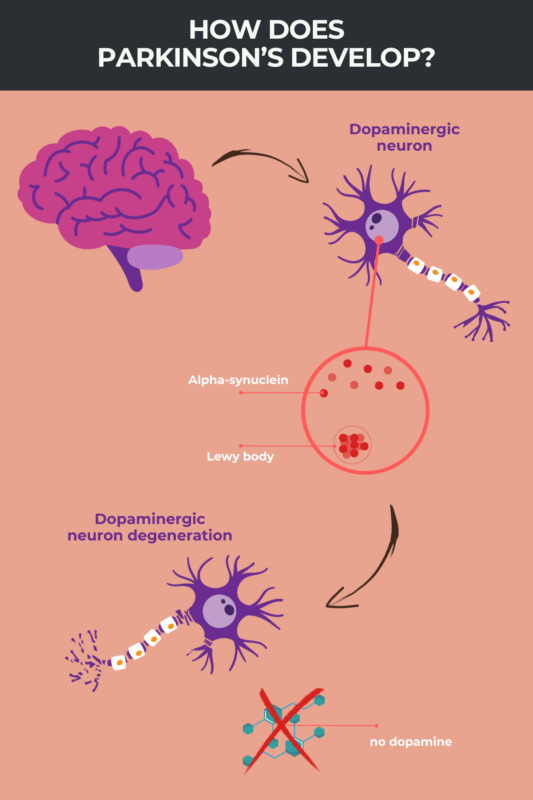Parkinson’s disease overview
Parkinson’s disease is a disorder wherein certain cells in the brain gradually sicken and die off. This causes problems with brain signaling and gives rise to a characteristic set of motor symptoms, namely slowed movements, rigidity, tremor, and balance problems, as well as nonmotor symptoms. These can include problems with sleep, emotional complications, and difficulty with cognition and memory.
Parkinson’s is the second-most common neurological disorder after Alzheimer’s disease. It’s estimated that more than 10 million people around the world are living with Parkinson’s. The disease is named for James Parkinson, a British physician who published a description of it in 1817.
Parkinson’s usually affects people late in life. Only about 10% to 20% of patients are diagnosed before age 50. It’s estimated that about 1% of adults in the U.S. older than 65 have Parkinson’s. Parkinson’s disease also is more common in men than women, for reasons that aren’t clear.
There is no cure for Parkinson’s disease and there currently aren’t any therapies that can slow or stop its progression. However, there are a range of available medications and supportive therapies that can help manage Parkinson’s disease symptoms and make living with it easier.
Causes
Parkinson’s disease is caused by the progressive dysfunction and death of dopaminergic neurons, cells in the brain that are responsible for making dopamine.
Dopamine is a neurotransmitter, a signaling molecule that nerve cells use to communicate with each other and the rest of the body. The loss of dopamine-making cells in Parkinson’s disease causes problems with nerve signaling, which ultimately gives rise to the disease’s symptoms.
The reasons dopamine-making neurons die off in Parkinson’s aren’t fully understood. It’s thought that Lewy bodies, abnormal protein clumps in the brain, play a role. While Lewy bodies usually contain more than one type of protein, in Parkinson’s, a main component of them is a protein called alpha-synuclein.
Runaway inflammation in the brain is also thought to play a role, but scientists are still working to understand exactly what the underlying biological causes of Parkinson’s are.
In some rare cases, Parkinson’s can be caused by mutations in specific genes. About 5 to 10% of people with Parkinson’s carry a known disease-causing mutation. Genetics are also thought to play a role in influencing Parkinson’s risk in other cases, but the details aren’t completely understood.
Although the causes of Parkinson’s disease aren’t fully known, a few risk factors for it have been identified, including a history of brain injury and exposure to certain toxins and chemicals such as the solvent trichloroethylene (TCE) and the herbicide paraquat.

Early signs and symptoms
Parkinson’s affects everyone differently. Not everyone with Parkinson’s will have every possible symptom and their order and severity can vary widely from person to person.
Early signs
Some symptoms that are common in the earliest stages of Parkinson’s include:
- tremor
- constipation
- violently acting out dreams, known as REM sleep behavior disorder
- loss of smell
- depression
- fatigue
- trouble rising from a chair
- small, cramped handwriting
- weak, quiet voice
- less movement in facial expressions
- dizziness or fainting
- stooping or hunching over
- arms not swinging normally while walking.
Motor symptoms
Parkinson’s disease is classically characterized by four motor symptoms:
- abnormally slow movements, known as bradykinesia
- tremor (uncontrolled shaking)
- rigidity (stiffness)
- difficulty with balance and problems walking, known as postural instability.
Bradykinesia is a defining symptom of Parkinson’s. All people diagnosed with Parkinson’s experience bradykinesia.
Tremor is usually one of the first noticeable Parkinson’s motor symptoms to develop, though as many as one in five people with Parkinson’s don’t experience tremor.
Rigidity usually isn’t very noticeable in the early stages of Parkinson’s disease, but virtually all people with Parkinson’s will experience it at some point.
Problems with balance and walking don’t usually appear until relatively late in the course of Parkinson’s disease, but almost everyone with Parkinson’s will eventually experience these symptoms.
In some patients, Parkinson’s causes other motor symptoms, including vision problems such as blurred vision or difficulty looking up, painful muscle cramps (dystonia), and difficulty maintaining an upright posture, which can lead to stooping, and abnormal curvature of the spine (scoliosis or kyphosis).
Other symptoms
In addition to the disease’s characteristic motor symptoms, people with Parkinson’s also can experience a range of nonmotor symptoms and complications, including:
- mood issues like depression and anxiety
- trouble with cognition and memory
- difficulty sleeping and REM sleep behavior disorder (violently acting out dreams)
- trouble swallowing and excessive drooling
- constipation and other digestive issues
- orthostatic hypertension (a sudden drop in blood pressure when standing, which can cause lightheadedness or fainting)
- loss of smell
- oily skin or excessive sweating
- frequent or urgent urination
- difficulties with sexual performance.
Diagnosis
There isn’t any one test that can diagnose Parkinson’s disease. Instead, the diagnosis is made based upon the symptoms that a person is having.
In order to be diagnosed with Parkinson’s, a person must have bradykinesia (slowed movements), along with at least one other characteristic motor symptom, usually tremor and/or rigidity, since walking and balance problems don’t typically develop until relatively late in the disease’s progression.
To confirm a Parkinson’s disease diagnosis, other conditions that might cause similar symptoms must be ruled out. A number of tests may help confirm a diagnosis, from those to see if symptoms ease in response to a common Parkinson’s treatment to those that look for specific molecular changes in the brain that are characteristic of the disease.
Types
Parkinson’s disease is sometimes divided into subtypes, such as familial Parkinson’s disease, which refers specifically to people with a family history of the disease, or early-onset Parkinson’s, which is usually defined as Parkinson’s that begins before age 50.
The term “parkinsonism” refers to any condition that causes Parkinson’s-like motor symptoms. Parkinson’s disease, known as primary parkinsonism, is the most common type and accounts for roughly 80% of all cases of parkinsonism.
There are also several more rare forms of atypical parkinsonism, also called “Parkinson’s Plus,” which are marked by Parkinson’s-like symptoms in addition to other characteristic symptoms and biological changes. These include:
- dementia with Lewy bodies, which is characterized by Parkinson’s-like symptoms and brain changes, but with earlier changes in cognition than those seen in Parkinson’s disease
- progressive supranuclear palsy (PSP), which features abnormal eye movements and a tendency to lean backward in addition to Parkinson’s-like symptoms, and is marked by toxic clumps of the protein tau in the brain
- corticobasal degeneration, wherein motor symptoms affect one side of the body substantially more than the other and toxic clumps of tau in the brain are present
- multiple system atrophy (MSA), which is characterized by Parkinson’s-like symptoms, in addition to pronounced problems regulating unconscious bodily functions like digestion and sweating.
There are also secondary forms of parkinsonism, where Parkinson’s-like symptoms develop as a complication of other conditions. These include:
- drug-induced parkinsonism, where Parkinson’s-like symptoms arise due to side effects of medications
- vascular parkinsonism, where symptoms are caused by problems with blood flow in the brain
- normal pressure hydrocephalus, where symptoms are driven by abnormal pressure around the brain
- some viral infections, such as influenza, West Nile virus, and herpes zoster (which causes chickenpox and shingles)
- exposure to toxins such as carbon monoxide
- injuries or tumors in the brain.
Treatment
There is currently no cure for Parkinson’s disease and there aren’t any therapies that can stop the disease from progressing. But numerous treatments can make living with Parkinson’s more manageable.
The gold standard treatment for Parkinson’s is levodopa and its derivatives, which are therapies that work to give the brain more raw material to make dopamine.
Levodopa therapies are usually effective at easing Parkinson’s motor symptoms, though they also can cause side effects including dyskinesia (uncontrolled movement) and over time they become less effective as patients lose more dopamine-making brain cells. A few medicines are available to ease levodopa-induced dyskinesia and manage symptoms when levodopa is not fully effective.
Several other types of treatments may be used alone or in combination with levodopa to help manage Parkinson’s motor symptoms, including:
- dopamine agonists, which work to mimic the activity of dopamine in the brain
- MAO-B inhibitors, which increase brain dopamine levels by inhibiting a brain enzyme that breaks down dopamine
- COMT inhibitors, which work to allow more levodopa to get into the brain
- anticholinergic medications, which work by blocking the activity of a brain chemical that helps to coordinate movement.
A surgical procedure called deep brain stimulation (DBS), which involves implanting a device to deliver electrical stimulation to specific regions of the brain, also may help control Parkinson’s motor symptoms.
In addition to treatments for motor symptoms, a range of therapies can help ease nonmotor complications of Parkinson’s. In most cases, managing these symptoms is similar to what’s done for people in the general population; depression may be treated with antidepressants, constipation with laxatives, and so forth.
Apart from medications, a range of supportive therapies including exercise, physical, occupational and speech therapies, and meditation may help manage symptoms and navigate life with Parkinson’s.
Life expectancy
Parkinson’s disease itself is not fatal, though it may increase the risk of life-threatening complications such as pneumonia or serious falls. Most people with Parkinson’s will die from other common fatal problems like heart disease or cancer.
For most people with Parkinson’s disease who receive modern treatment, life expectancy is comparable to what would be expected for someone in the general population. For example, someone diagnosed with Parkinson’s at age 60 is expected to live about 23 more years on average, for a total life expectancy of 83, which is around the general life expectancy.
Parkinson’s is a progressive disease, meaning its symptoms tend to worsen over time. However, the rate at which the disease progresses can vary widely from person to person. A few factors that may influence disease progression include:
- sex: Parkinson’s tends to progress more quickly in males than in females
- age at onset: generally Parkinson’s progresses more quickly in people who are older when they first develop symptoms
- symptoms: patients who have early cognitive problems tend to have faster disease progression, whereas patients who only have tremor as their first symptom tend to have slower disease progression.
Related conditions
People with Parkinson’s disease are at significantly increased risk of developing melanoma, a type of skin cancer. People with melanoma also are at increased risk of developing Parkinson’s.
Up to about one in four people with Parkinson’s will have pseudobulbar affect (PBA), a condition that’s characterized by uncontrolled bouts of crying or laughing that are not related to a person’s emotions.
Useful resources and support
At Parkinson’s News Today, there are forums where people affected by Parkinson’s can share information and connect with each other, as well as columns written by people who share their first-hand experiences.
Other organizations that provide support for people with Parkinson’s include:
- Parkinson’s Foundation
- American Parkinson Disease Association (APDA)
- Michael J. Fox Foundation for Parkinson’s Research (MJFF)
- European Parkinson’s Disease Association
- The Davis Phinney Foundation
- Parkinson’s Resource Organization (PRO)
There also are many other resources and support groups for people with Parkinson’s that serve people living in particular areas.
Parkinson’s News Today is strictly a news and information website about the disease. It does not provide medical advice, diagnosis, or treatment. This content is not intended to be a substitute for professional medical advice, diagnosis, or treatment. Always seek the advice of your physician or another qualified health provider with any questions you may have regarding a medical condition. Never disregard professional medical advice or delay in seeking it because of something you have read on this website.
Recent Posts
- Immune T cell response may detect Parkinson’s before symptom onset
- Bezisterim clinical trial uses hybrid design to promote accessibility
- Parkinson’s advocacy groups call for ‘robustly funded, collaborative NIH’
- I may be overprotective, but it’s progress, not perfection
- Living with Parkinson’s reminds me what friends are for
FAQs about Parkinson’s disease
In the early stages of Parkinson’s, the symptoms are generally mild and don’t cause major problems with daily life. Motor symptoms usually affect just one side of the body in early stages of Parkinson’s. Some common early signs of Parkinson’s include tremor, arms not swinging normally while walking, loss of smell, and acting out dreams during sleep.
Parkinson’s disease can affect many areas of the body. The disease is marked by motor symptoms that include slowed movement, rigidity, tremor, and balance problems. Parkinson’s also can cause a range of other issues including sleep problems, cognitive difficulty, constipation, loss of smell, and sexual dysfunction.
Parkinson’s disease is the second-most common neurological disorder after Alzheimer’s disease. It’s estimated that about 10 million people worldwide are living with Parkinson’s and the disease is thought to affect roughly 1% of adults older than 65.
Parkinson’s disease itself is generally not fatal, but it can increase the risk of life-threatening problems like serious falls or pneumonia. Life expectancy for most people with Parkinson’s disease is comparable to the general population.
Related articles

 Fact-checked by
Fact-checked by 







